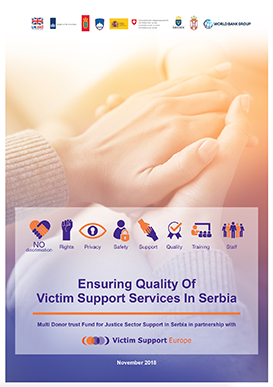 Victim support as assistance that should be systematically provided to all victims of crime should satisfy standards of quality. Existence of quality standards are important for victims themselves, as knowing that services are subject to scrutiny, can be reassuring. Referral organizations can find it useful to be able to easily identify organizations to which they can send victims, with confidence in the quality of the service offered. Governments and donors can find it valuable to be able to easily assess the qualifications of an organization when funding is being allocated. In addition, given the specific vulnerabilities of victims of crimes, it is a priority that the service should be of the required standard as to avoid further traumatization and re-victimization.
Victim support as assistance that should be systematically provided to all victims of crime should satisfy standards of quality. Existence of quality standards are important for victims themselves, as knowing that services are subject to scrutiny, can be reassuring. Referral organizations can find it useful to be able to easily identify organizations to which they can send victims, with confidence in the quality of the service offered. Governments and donors can find it valuable to be able to easily assess the qualifications of an organization when funding is being allocated. In addition, given the specific vulnerabilities of victims of crimes, it is a priority that the service should be of the required standard as to avoid further traumatization and re-victimization.
To support Serbian authorities to develop quality standards for victim support services the MDTF JSS in partnership with Victim Support Europe prepared report
“Ensuring Quality of Victim Support Services in Serbia”. Approach to ensuring quality standards varies in comparative practices. Some countries have a rigorous approach to ensure quality assurance systems for victim support services: organizations embrace existing systems, such as ISO standards – as is the case in Portugal. Other countries introduce their own rigorous measurements, such as the Marianne Charter in France, which sets standards for quality of services provided by French administrative bodies. In other instances there are elaborate internalized processes for imposing quality standards on victim support services: for example, the membership policies of France Victimes, the French federation of victim support, which brings together 130 member associations across all French territories.
The objective of introducing standards should be to help organizations to raise the caliber of their operational capabilities. Standards are essential to the improvement of programs and while levels of expectation and specific requirements need to be set, along with rules applicable to specific forms of services (e.g. legal aid or psychological support), they should not prohibit the support offered to victims of crime, but rather should encourage organizations to improve their care and allow them to better respond to victims’ needs.
The Report proposes a set of tailored standards for Serbian victim support providers. The proposed standards should be acceptable to and seen as valuable by different stakeholders from policy makers to NGOs and the judiciary. In addition, a draft guidance document will explain the individual elements, as well as suggesting a set of indicators to verify the correct application of the standards and provide practical tools to help organizations comply with the suggested quality assurance systems.
Proposed criteria have been developed with the cooperation of Serbian stakeholders and include features common to existing guidelines. As a minimum guarantee of conformity, the future Serbian system of quality standards for victim support services needs to ensure an independent and unbiased verification of compliance with standards. The approach will depend on many factors, including the time and resources available, as well as the circumstances and context within which standards will be introduced.
The Report requires informed decision making by Serbian stakeholders to decide which path to take in the adoption of the proposed standards. Whether these criteria will be adopted, or other priorities will be set; whether standards will be imposed through a governmental instrument or adopted by victim support providers; whether they will be controlled through a rigorous system of licencing or through a softer approach of study visits, evaluations and internal regulation – all very important –are decisions to be taken by interested parties in Serbia. There are benefits and shortcomings in each approach and standardization needs to be the outcome of in-depth discussion and agreement between the governmental and non-governmental actors, working towards better services for victims of crimes
 Victim support as assistance that should be systematically provided to all victims of crime should satisfy standards of quality. Existence of quality standards are important for victims themselves, as knowing that services are subject to scrutiny, can be reassuring. Referral organizations can find it useful to be able to easily identify organizations to which they can send victims, with confidence in the quality of the service offered. Governments and donors can find it valuable to be able to easily assess the qualifications of an organization when funding is being allocated. In addition, given the specific vulnerabilities of victims of crimes, it is a priority that the service should be of the required standard as to avoid further traumatization and re-victimization.
Victim support as assistance that should be systematically provided to all victims of crime should satisfy standards of quality. Existence of quality standards are important for victims themselves, as knowing that services are subject to scrutiny, can be reassuring. Referral organizations can find it useful to be able to easily identify organizations to which they can send victims, with confidence in the quality of the service offered. Governments and donors can find it valuable to be able to easily assess the qualifications of an organization when funding is being allocated. In addition, given the specific vulnerabilities of victims of crimes, it is a priority that the service should be of the required standard as to avoid further traumatization and re-victimization.